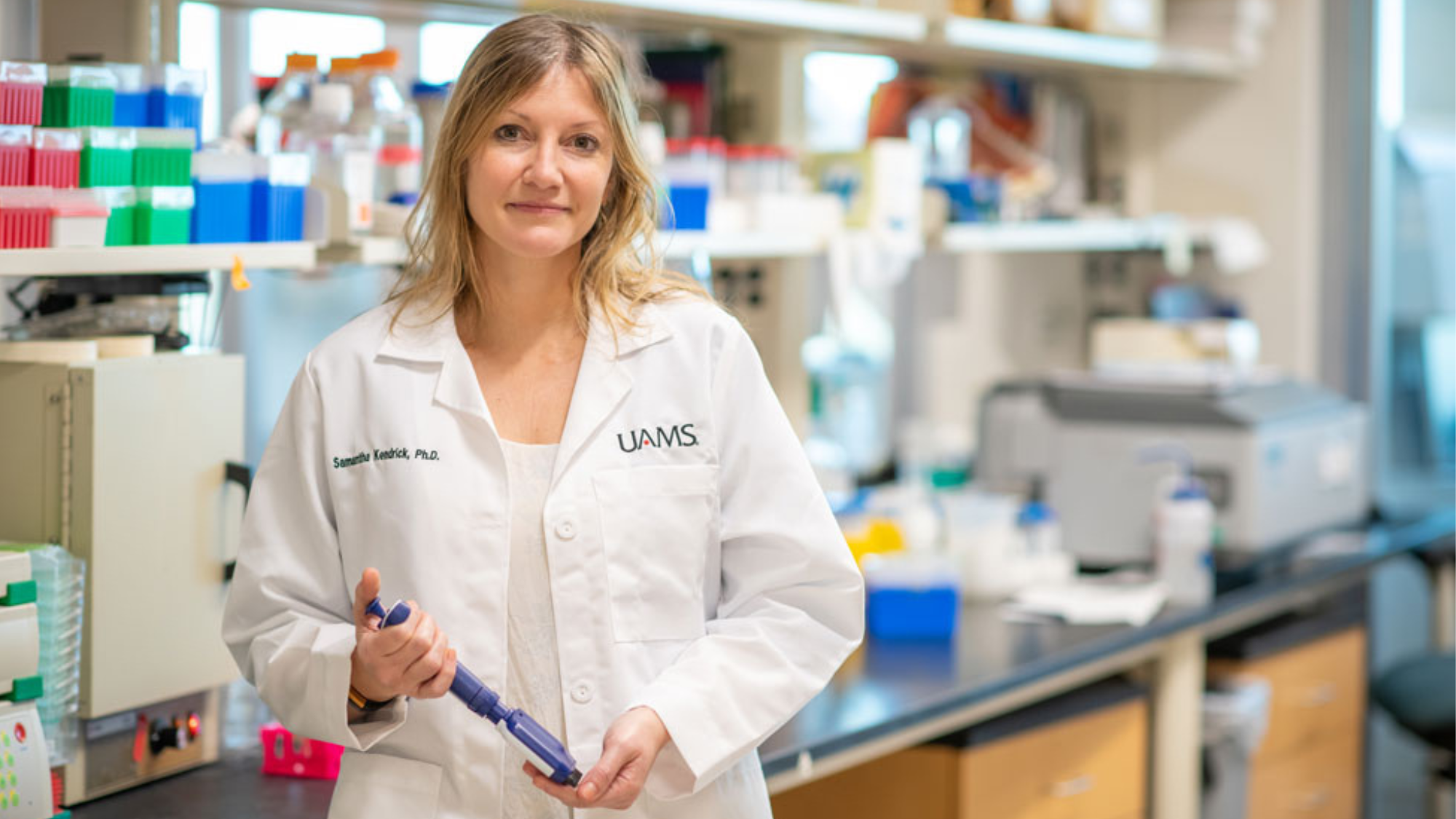View Larger Image

Samantha Kendrick, Ph.D., has received a $760,000 grant from the U.S. Department of Defense to study diffuse large B-cell lymphoma (DLBCL).
Image by Bryan Clifton
U.S. Defense Department Awards UAMS Cancer Researcher $760,000 to Study Aggressive Type of Lymphoma
| LITTLE ROCK — Samantha Kendrick, Ph.D., assistant professor in the Department of Biochemistry and Molecular Biology at the University of Arkansas for Medical Sciences (UAMS), has received a $760,000 grant from the U.S. Department of Defense to study a fast-growing type of non-Hodgkin lymphoma common among veterans and military personnel.
Diffuse large B-cell lymphoma (DLBCL) is an aggressive blood cancer that affects B-lymphocytes, a type of white blood cell that makes antibodies to fight infections and are an important part of the lymphatic system. Second only to melanoma, DLBCL is the fastest growing cancer in the world and accounts for 30% of cancer cases worldwide. More than 18,000 people are diagnosed with DLBCL each year.
Funded by the Defense Department’s Congressionally Directed Medical Research Program, Kendrick’s three-year study entitled, “Targeting Unique DNA Structures to Repress Oncogenic Signaling in Lymphoma,” will use sophisticated technology called proteomics to identify proteins that interact with a unique DNA structure called the G-quadruplex (G4) that forms within a regulatory region of a key B-cell receptor gene.
“This grant will allow us to understand the underlying biology of one of the most common B-cell cancers and what is really driving some of the aggressive tumors that are unresponsive to current therapy,” added Kendrick, a cancer researcher at the UAMS Winthrop P. Rockefeller Cancer Institute whose husband is a veteran and lymphoma survivor.
Lymphoma is among one of many cancers that can be connected to a veteran’s military service. Nearly 13,000 veterans with non-Hodgkin’s lymphoma received VA disability compensation in 2021. Lymphoma is often linked to exposure to toxic substances, which is the case for many military service members. Risk for lymphoma is 50% higher for Vietnam veterans.
“Lymphomas are not single diseases but consist of multiple subsets that will require personalized medicine for some patients to survive,” said Kendrick. “It’s very exciting to be part of this foundational research to better understand how these tumors develop.”
“Dr. Kendrick is one of our rising research stars in the UAMS Winthrop P. Rockefeller Cancer Institute,” said Alan Tackett, Ph.D., deputy director of the Cancer Institute. “Her research will shed light on the underlying principles of DLBCL biology that will enable the development of the next generation of therapies to treat this aggressive disease.”
Kendrick has been studying lymphoma for more than a decade, beginning as a doctoral student at the University of Arizona. Originally from Canada, she completed her undergraduate and graduate studies at McMaster University in Ontario. She is the recipient of a 2013 Lymphoma Research Foundation Postdoctoral Fellowship and is a Leukemia and Lymphoma Society Woman of the Year nominee. She joined UAMS in 2017.
UAMS is the state’s only health sciences university, with colleges of Medicine, Nursing, Pharmacy, Health Professions and Public Health; a graduate school; a hospital; a main campus in Little Rock; a Northwest Arkansas regional campus in Fayetteville; a statewide network of regional campuses; and eight institutes: the Winthrop P. Rockefeller Cancer Institute, Jackson T. Stephens Spine & Neurosciences Institute, Harvey & Bernice Jones Eye Institute, Psychiatric Research Institute, Donald W. Reynolds Institute on Aging, Translational Research Institute, Institute for Digital Health & Innovation and the Institute for Community Health Innovation. UAMS includes UAMS Health, a statewide health system that encompasses all of UAMS’ clinical enterprise. UAMS is the only adult Level 1 trauma center in the state. UAMS has 3,485 students, 915 medical residents and fellows, and seven dental residents. It is the state’s largest public employer with more than 11,000 employees, including 1,200 physicians who provide care to patients at UAMS, its regional campuses, Arkansas Children’s, the VA Medical Center and Baptist Health. Visit www.uams.edu or uamshealth.com. Find us on Facebook, X (formerly Twitter), YouTube or Instagram.###